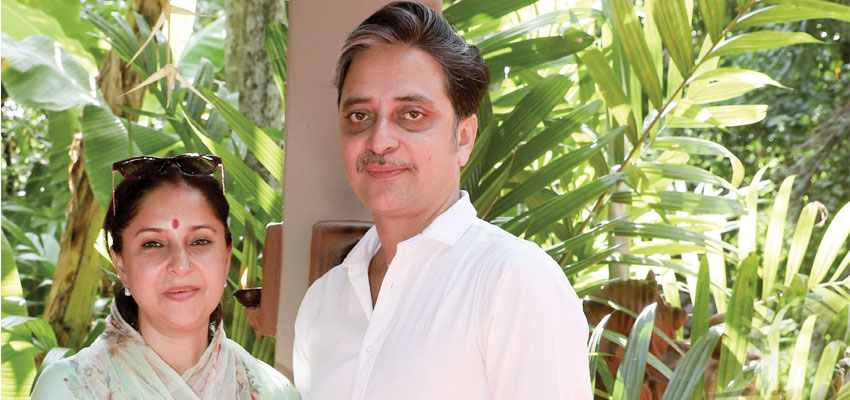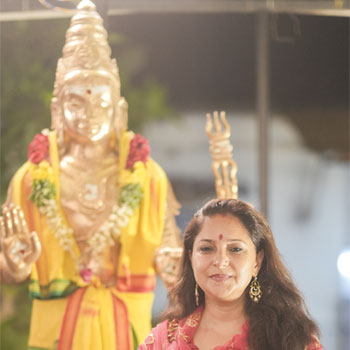Grace, Heritage & Change

Up close with the elegant and dynamic Rani Meghna Yogeshwari Kumari of Jaisalmer, we explore what it truly takes to uphold a regal legacy while embracing the winds of change along with a centuries’ old bond of trust and connect with the people. From the cool climes of her Himachali childhood to the golden sands of her marital home, her journey is one of resilience, adaptation, service and grace. Proudly rooted in her beliefs, she believes in the values of inclusivity, surrender and karma.
In this exclusive Corporate Citizen interview, she shares her perspectives on tradition, transformation and the timeless spirit of Rajasthan.
Corporate Citizen: Take us through your childhood. Where are you from?
Rani Meghna Yogeshwari Kumari: I come from a royal family in Himachal Pradesh. My hometown is Nahan, which is the district headquarters of Sirmaur. Historically, it was the erstwhile princely state of Sirmaur, one of the largest in what is now Himachal Pradesh.
CC: You spent your childhood in the lap of gorgeous Himachal. Tell us about it.
Himachal, as you know, had a significant British influence, and that shaped many aspects of life there. While traditions were similar to the rest of India, there was a noticeable touch of the British Raj era. Education was a priority, and hill stations had some of the best schools. I studied at The Lawrence School, Sanawar, one of the oldest co-ed boarding schools in the world.
CC: Something like Lovedale?
Lovedale came later, a brother school, built after ours, and there’s also another one in Pakistan; together, we are three sibling schools. Studying at Lawrence was wonderful because of its co-ed environment, which gave us a very balanced upbringing. My family too, was progressive and there was never any distinction between what boys or girls could do.
My father encouraged us to ride horses, trek, and embrace the outdoors. We weren’t very aware of being princes or princesses, because our upbringing was so natural and free-spirited. That was a huge blessing.
CC: Moving to Jaisalmer after marriage must have been quite a change.

Yes, it was. Jaisalmer is breathtakingly beautiful, and my husband’s family is wonderful. But, the societal structure was different. There was a more defined distinction between genders, which was a contrast to my upbringing. For instance, a man is a man, and a woman is a woman—and the distinction is always maintained.
Sixteen years ago, when I got married, I saw cultural norms I hadn’t experienced before—like women sitting separately at weddings and social gatherings. It was a culture shock. I had grown up hearing stories from my grandmother about an India that no longer existed, but Jaisalmer felt like stepping back in time. It’s a fascinating blend of the old and the new, where traditions are still deeply rooted.
CC: Was it a difficult adjustment?
Not entirely. My father’s aunts were married into Rajasthani families, so the customs weren’t unfamiliar.
CC: True, but this time, you had to live it.
Exactly! It took me a while to understand, adapt, and then find my own balance between tradition and modernity. But, over time my husband and I have made small yet meaningful changes. For instance, when we host parties or gatherings, we do it our way—everyone is included. Recently, we had a wedding in the family, and for the first time young and old, men and women, all celebrated together. It was a wonderful experience. Change is happening, sometimes in subtle ways, but it’s there.
"I believe in the philosophy of Karma Yoga, the power of action, and the teachings of the Bhagavad Gita. Arpan karo—surrender yourself to the feet of the Lord, and he will take care of the rest
-Rani Meghna Yogeshwari Kumari
CC: How did you meet your husband? How was it arranged?
We met through our families, but not in the traditional arranged marriage way. I first met his sister—our families were already acquainted. My brother and sister met his siblings first, and I met him last. At first, we were just family friends, and I had no idea marriage was even being considered. Two years later, when we met again, something clicked—we fell in love. The family approved, and within a year, we were married in January 2008.
CC: Tell us about your children?
We have three children. Our eldest daughter, Gayatri, is almost 16 years old. Our second daughter, Sanyogita Singh, is nearly 15, and our youngest son, Himangat, is nine.
CC: Your family has a royal lineage with a deep historical connection to the people. Tell us about that and your role in taking it ahead.
Yes, there’s a profound, centuries-old bond between our family and the people. I appreciate it more because of my upbringing in Himachal, where our home was always open. My grandmother, my father—everyone was available to the people, whether from nearby villages or the remotest corners of the state. It was an unspoken bond that had to be honoured, being there for them.
Marrying into my husband’s family was a natural continuation of this tradition. He is extremely social, and our home remains open to all, just as it has been for generations. The expectation is that we are always available—day or night. This isn’t common everywhere, but in our families, it’s simply the way things are. We are blessed to serve, and for us the people come first.
CC: Do you have any formal organisation for your social work?
Yes, I founded a nonprofit organisation called Uthishta Sansthan, which has been doing good work for over 10 years. It focuses on empowering women and children.
CC: What does ‘Uthishta’ mean?
Uthishta’ means to awaken, to arise, and to act. It’s inspired by Krishna’s words to Arjuna on the battlefield, “Rise, Arjuna!" he said to the warrior in those critical moments of self-doubt, just before the battle of Kurukshetra. And, sure enough, Arjuna did perform his duty ultimately.
It’s a powerful mantra that drives my life. Whenever you are down, filled with doubt, or overwhelmed by negativity, you must have faith and act without worrying about the fruit. That’s the philosophy behind my work, especially for the women of India and Jaisalmer.
CC: That’s inspiring. Do tell us, how do you bring up your children?
The same way I was raised—through seamless and natural service. Growing up, we never realised we were “serving” people; it was simply our way of life. Respect was integral, intrinsic and all pervasive. Domestic staff were never addressed by name but as Kaki or Chachi—they were part of the extended family, having been with us for generations. My husband shares the same values, and we ensure our children grow up prioritising people, connections and the spirit of service. On their birthdays or festivals, they participate in our NGO work. They must contribute from their pocket money, not as an obligation, but from their own hearts. The first lesson is always to give before you celebrate.
I also share stories with them, just as my grandmother did with me—stories from Indian history, folklore, and mythology, each carrying an important life lesson. Storytelling is intrinsic to Indian culture; it’s how we pass down wisdom through practical and tellable stories that resonate and connect with children.
CC: That’s wonderful. Tell us more about your life philosophy and core beliefs.
Life is about inclusivity—taking along both people and experiences, good and bad. You grow only when you accept everything life throws at you. And, above all, I have absolute faith in God. When I’m lost, I surrender to the bigger picture, even if I don’t fully understand it at the moment.
I believe in the philosophy of Karma Yoga, the power of action, and the teachings of the Bhagavad Gita. Arpan karo—surrender yourself to the feet of the Lord, and he will take care of the rest. Everything unfolds in its own time.